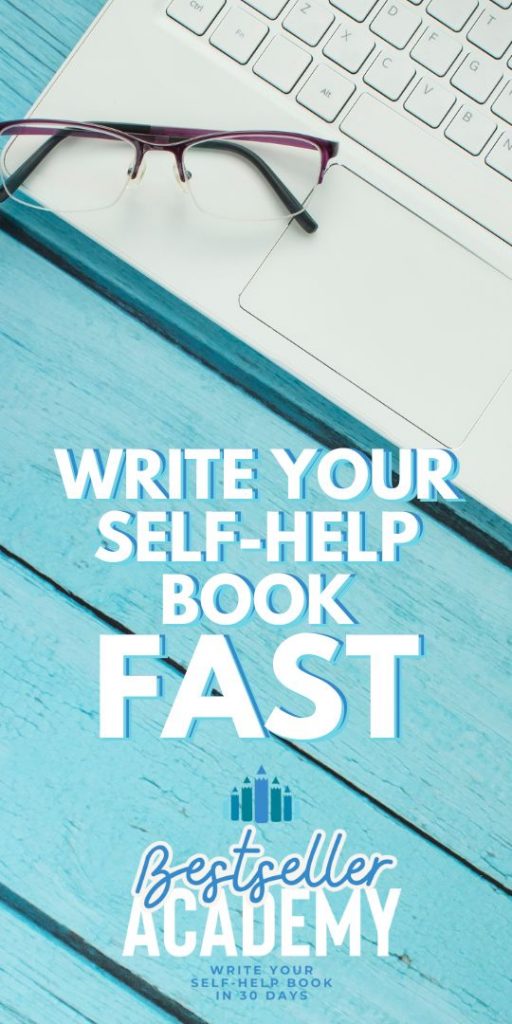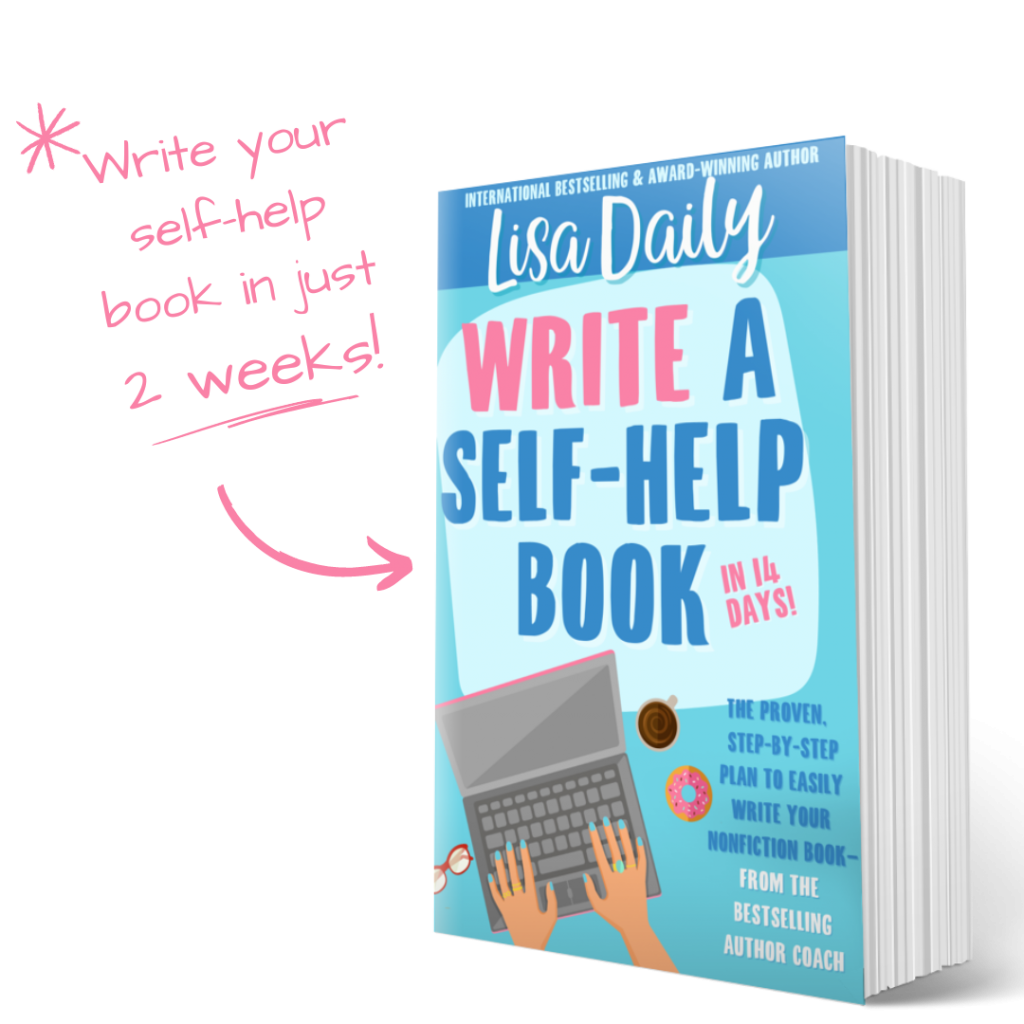

Hey there, future bestseller!
Have you ever found yourself flipping through the pages of a self-help book, thinking, “Hey, I could write something like this!”?
Guess what? You absolutely can! Welcome to the world of self-help book writing, where the only limit is your imagination (and maybe a touch of writer’s block, but we’ll tackle that together.)
In this blog post, we’re diving headfirst into the question on everyone’s mind: Can anybody write a self-help book? Spoiler alert: the answer is a resounding YES!
Demystifying self-help book writing
Do you have to be an expert to write a self-help book?
Writing a self-help book might seem like a daunting task, especially if you’ve never written one before. But fear not, aspiring author!
Who can write self-help books? The truth is, anyone can write self-help books with the right guidance and mindset. It’s all about breaking down the process into manageable steps and tapping into your unique experiences and insights.
One of the first things to understand is that self-help books come in many shapes and sizes. They can range from self-help memoir-style narratives to practical guides filled with exercises and tips.
The key is to find a format that works for you and resonates with your audience. By demystifying the process, you’ll see that writing a self-help book is not as intimidating as it may seem. With a clear plan and a dash of creativity, you’ll be well on your way to penning your own self-help masterpiece.
Dispelling common myths
Alright, let’s get real for a moment. Writing a self-help book might seem like a daunting task, but let’s bust some myths right off the bat. You don’t need a Ph.D. or a wall full of publishing accolades to share your wisdom with the world.
What truly matters is your authenticity, passion, and a genuine desire to help others. Your unique experiences and insights are what make your voice valuable, not a string of fancy credentials. So, if you’ve ever doubted whether you have what it takes to write a self-help book, toss those doubts out the window. You’ve got this!
Can I write a book with no experience? Tapping into your unique expertise
Every person has a wealth of life experiences and insights that can be the foundation for a compelling self-help book. Take a moment to reflect on your own journey—your triumphs, challenges, and the lessons you’ve learned along the way.
You may be wondering, Can I write a book with no experience?
This may be your first book, but good news, you’ve had experience. Maybe you’ve overcome adversity, found success in your career, or navigated through personal growth. These experiences, no matter how big or small, can offer valuable wisdom to others. Whether you’re a seasoned professional, an aspiring entrepreneur, or someone who’s simply passionate about a particular topic, there’s something unique about your perspective that can resonate with readers.
So, don’t underestimate the power of your own story and expertise—it could be the key to inspiring and helping others on their journey of self-discovery.
How do I become a self-help book writer?
So, you’re ready to dive into the world of self-help book writing? Awesome! Here’s the lowdown on how to kickstart your journey:
- Embrace Your Expertise: Remember, you don’t need a fancy degree or a string of accolades to write a self-help book. Tap into your unique life experiences, passions, and insights – that’s where your magic lies!
- Start Writing: It sounds simple, but the hardest part is often just getting started. Set aside dedicated time each day to write, even if it’s just a few paragraphs. The key is consistency – little by little, you’ll make progress.
- Hone Your Craft: Read widely in the self-help genre to get a feel for different writing styles and techniques. Experiment with your own voice and storytelling approach until you find what feels authentic to you.
- Get Feedback: Don’t be afraid to share your work with trusted friends, family, or writing groups. Constructive feedback can help you identify blind spots, strengthen your writing, and boost your confidence.
- Keep Learning: Stay curious, attend courses and workshops, listen to podcasts, read books on how to write self-help, and soak up as much knowledge as you can. There’s always room to grow and hone your craft as a writer.
- Take the Plunge: When you’re ready, start exploring publishing options – whether it’s traditional publishing, self-publishing, or something in between. Trust your instincts, and don’t be afraid to take risks.
Remember, every writer’s journey is unique, so don’t compare yourself to others. Stay true to your vision, stay persistent, and most importantly, have fun along the way! You’ve got this.
Overcoming self-doubt and imposter syndrome
Let’s face it, self-doubt and imposter syndrome can creep up on even the most seasoned, bestselling writers. (Myself included!)
You might find yourself questioning whether you’re qualified to write a self-help book or worrying that others will see right through you. But here’s the truth: those feelings are totally normal! Writing books can be daunting sometimes, especially when you feel like you’re a bit out of your depth.
Almost every writer has battled their inner critic at some point. The key is not to let these doubts hold you back from sharing your valuable insights with the world.
One way to combat imposter syndrome is by reframing your thoughts. Instead of focusing on what you lack, remind yourself of all the unique qualities and experiences that make you perfectly suited to write your book. And don’t be afraid to reach out for support when you need it. Whether it’s talking to a fellow writer, joining a writing course, or seeking guidance from a book coach, having a support system can make all the difference.
So, the next time imposter syndrome rears its ugly head, remember: you’ve got this!

Is there a course for writing a selfhelp book?
Is there a course for writing a selfhelp book? Absolutely! If you’re feeling a bit overwhelmed by the idea of writing your self-help masterpiece alone, fear not.
There are several courses out there designed to help aspiring authors just like you turn their ideas into reality. These courses offer step-by-step guidance, expert advice, and a supportive community to help you navigate the writing process with confidence. Whether you’re a total newbie or a seasoned writer looking to level up your skills, there’s a writing course out there that’s perfect for you.
Plus, enrolling in a course can provide you with the accountability and motivation you need to stay on track and finish your book in record time. So why go it alone when you can have expert guidance every step of the way?
Try: Bestseller Academy – Write a Self-Help Book in 30 Days course
Developing your writing voice
Finding your writing voice is like discovering your own superpower as an author. It’s what sets you apart from the rest of the pack and makes your words leap off the page. But how do you develop this magical voice of yours? Well, it starts with being true to yourself. Embrace your quirks, your passions, and your personality, and let them shine through in your writing. Don’t try to mimic someone else’s style—be boldly, unapologetically you.
Another great way to develop your voice is to read—a lot. Dive into books that inspire you, that make you laugh, that make you think. Pay attention to the authors’ voices and how they use language to convey their message. And don’t forget to practice writing regularly. The more you write, the more your voice will naturally emerge and evolve.
Above all, remember to stay authentic. Your readers will be able to tell if you’re trying to be something you’re not, and they won’t connect with your message as deeply. So be yourself, trust your instincts, and let your voice be heard.
How do you structure a self-help book?
Think of outlining your self-help book as the GPS guiding you on your writing journey, and lucky for you, I’ve got the perfect map: my free self-help book template download!
Just like you wouldn’t embark on a cross-country adventure without a trusty GPS, you shouldn’t dive into writing your book without a solid plan. Why? Because outlines are the backbone of your book—they keep everything organized, focused, and on track.
Using my self-help book outline, you can break down your big ideas into manageable chunks, ensuring each chapter flows smoothly into the next. Start by identifying the key themes or messages you want to convey, then map out the main points you’ll cover in each chapter. With my outline as your guide, you’ll have a clear roadmap for crafting a compelling and cohesive book.
Here’s a handy video I did a while back to explain the basic structure of a self-help book:
The goal is to keep your writing process as smooth and stress-free as possible. And with my self-help book outline by your side, you’ll be well-equipped to tackle any writing challenge that comes your way!
Next steps: Download my free book writing template pdf.

How do you write a self-help book fast?
Feeling the need for speed? No problemo! Whether you need to get your self-help book done fast for an upcoming launch, speaking event, conference, or some other reason, here are some turbocharged tips to help you write your self-help book at lightning speed:
- Get Organized: Before you dive in, take some time to outline your book. A clear roadmap will keep you focused and on track, saving you precious time in the long run. Need a hand with outlining? Check out my book, Write a Self-Help Book in 14 Days or enroll in the Bestseller Academy: Write a Self-Help Book in 30 Days course for expert guidance.
- Set Realistic Goals: Break down your writing process into manageable chunks and set daily or weekly word count goals. Be ambitious, but don’t burn yourself out. Remember, slow and steady wins the race!
- Eliminate Distractions: Minimize interruptions and create a dedicated writing space where you can zone in and get stuff done. Consider using productivity apps or tools that block out distractions and keep you laser-focused.
- Write with Purpose: Every word counts! Stay focused on your message and avoid rambling or going off on tangents. Keep your writing clear, concise, and impactful to maximize your efficiency.
- Stay Accountable: Hold yourself accountable by setting deadlines and sharing your progress with a writing buddy, accountability group, or book coach. Knowing that someone else is cheering you on can provide the motivation you need to keep pushing forward.
- Embrace Writing Sprints: Break your writing sessions into short, focused bursts of productivity known as writing sprints. Set a timer for 20-30 minutes and write like the wind! You’ll be amazed at how much you can accomplish in a short amount of time.
With these strategies in your toolkit, you’ll be well on your way to writing your self-help book in record time. So rev up those engines, buckle up, and get ready to zoom past the finish line!
Writing and revising your manuscript
Now that you’ve got your outline locked in and your ideas flowing, it’s time to dive into the nitty-gritty of writing your self-help book. Picture yourself as a sculptor, chiseling away at a block of marble to reveal the masterpiece within. Each word, sentence, and paragraph is a stroke of your chisel, shaping your book into something truly extraordinary.
But here’s the thing: writing a book is no walk in the park. It takes dedication, discipline, and a whole lot of coffee (or tea, if that’s more your style). So, how do you stay motivated when the blank page is staring you down? Simple—break it down into bite-sized chunks. Set yourself small, achievable goals, like writing 500 words a day or completing a chapter by the end of the week. Celebrate your progress along the way, and before you know it, you’ll have a completed manuscript staring back at you.
But wait, we’re not done yet! Once you’ve written your first draft, it’s time to roll up your sleeves and get down to the nitty-gritty of revisions. Think of this stage as polishing your diamond in the rough, smoothing out any rough edges and ensuring every word shines bright. Don’t be afraid to be ruthless—cut out any fluff, clarify confusing passages, and tighten up your prose until it sparkles.
And here’s a pro tip: enlist the help of beta readers or editors to give your manuscript a fresh pair of eyes. They’ll provide invaluable feedback and catch any blind spots you may have missed.
Navigating the publishing process
So, you’ve penned your masterpiece, revised it to perfection, and now you’re ready to share it with the world. But how do you go about getting your book out there? Fear not, my aspiring authors, for I’m here to guide you through the labyrinth that is the publishing process.
First things first, let’s talk about your publishing options. You’ve got two main routes to choose from: traditional publishing and self-publishing.
Traditional publishing involves submitting your manuscript to literary agents or publishing houses, who handle the editing, printing, and distribution of your book. A traditional publisher will pay you an advance against royalties for your book, and in return, they’ll have final say over some aspects of your book including distribution, pricing, the cover, and marketing (or lack thereof.) Traditional publishing is the dream for many, but it can also be a tough nut to crack, requiring perseverance, patience, and a bit of luck.
On the flip side, self-publishing puts you firmly in the driver’s seat, giving you complete control over every aspect of the publishing process. From cover design to marketing strategy, the power is in your hands. Plus, with the rise of digital platforms like Amazon Kindle Direct Publishing and IngramSpark, self-publishing has never been more accessible or affordable. It’s the perfect option for authors who crave creative freedom and control over their own work and aren’t afraid to roll up their sleeves and get their hands dirty.
What’s the easiest way to get a book published?
Self-publishing is the easiest, quickest, and generally the most profitable way to get your book published.
How much does it cost to publish a self-help book? If you’re being published by a traditional publisher, they’ll pay you an advance – although you will generally be expected to spend both time and money to promote your book. If you’re going the self-publishing route, expenses vary due to your particular skills and talents, and can range anywhere from free for the DIYer to several thousand dollars for those who hire out for things like cover design, formatting, etc. I know you came her wondering “Is it possible for anyone to write a book?” (yes), it may surprise you to learn that it’s also possible for almost anyone to publish a book as well.
So, which path will you choose? Whether you opt for traditional publishing or self-publishing, remember that the most important thing is to find the option that works best for you and your book. And hey, if you need a helping hand along the way, you know where to find me!
Let’s close the book
And there you have it, my friends! You’ve now got all the tools, tips, and encouragement you need to embark on your self-help book writing journey. Whether you’re a seasoned author or a complete newbie, remember that writing a self-help book is within your reach – all it takes is a little courage, creativity, and a whole lot of heart.
But hey, if you’re feeling a bit overwhelmed or unsure of where to start, don’t sweat it!
That’s where the Bestseller Academy: Write a Self-Help Book in 30 Days course comes in. With expert guidance, personalized feedback, and a supportive community of fellow writers, you’ll have everything you need to turn your book dreams into a reality – in just 30 days!
So what are you waiting for? Click that enroll button, and let’s get ready to change the world, one self-help book at a time. I’ll see you on the bestseller list!


3 Responses